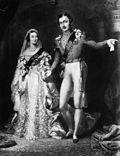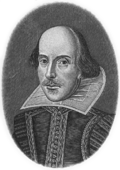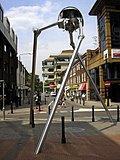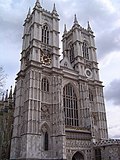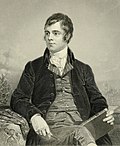Portal:United Kingdom
The United Kingdom Portal
 |
 |
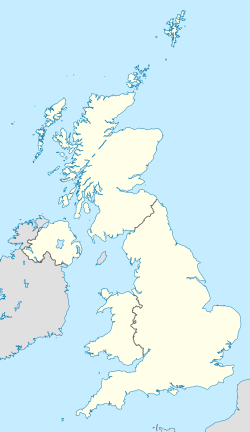
| |
The United Kingdom of Great Britain and Northern Ireland, commonly known as the United Kingdom (UK) or Britain, is a country in Northwestern Europe, off the coast of the continental mainland. It comprises England, Scotland, Wales, and Northern Ireland. The UK includes the island of Great Britain, the north-eastern part of the island of Ireland, and most of the smaller islands within the British Isles, covering 94,354 square miles (244,376 km2). Northern Ireland shares a land border with the Republic of Ireland; otherwise, the United Kingdom is surrounded by the Atlantic Ocean, the North Sea, the English Channel, the Celtic Sea, and the Irish Sea. The UK maintains sovereignty over the British Overseas Territories, which are located across various oceans and seas globally. The United Kingdom had an estimated population of over 68.2 million people in 2023. The capital and largest city of both England and the United Kingdom is London. The cities of Edinburgh, Cardiff, and Belfast are the national capitals of Scotland, Wales, and Northern Ireland, respectively.
The UK has been inhabited continuously since the Neolithic. In AD 43, the Roman conquest of Britain began; the Roman departure was followed by Anglo-Saxon settlement. In 1066, the Normans conquered England. With the end of the Wars of the Roses, the English state stabilised and began to grow in power, resulting by the 16th century in the annexation of Wales, and the establishment of the British Empire. Over the course of the 17th century, the role of the British monarchy was reduced, particularly as a result of the English Civil War. In 1707, the Kingdom of England and the Kingdom of Scotland united under the Treaty of Union to create the Kingdom of Great Britain. In the Georgian era, the office of prime minister became established. The Acts of Union 1800 incorporated the Kingdom of Ireland to create the United Kingdom of Great Britain and Ireland in 1801. Most of Ireland seceded from the UK in 1922 as the Irish Free State, and the Royal and Parliamentary Titles Act 1927 created the present United Kingdom.
The UK became the first industrialised country and was the world's foremost power for the majority of the 19th and early 20th centuries, particularly during the Pax Britannica between 1815 and 1914. The British Empire was the leading economic power for most of the 19th century, a position supported by its agricultural prosperity, its role as a dominant trading nation, a massive industrial capacity, significant technological achievements, and the rise of 19th-century London as the world's principal financial centre. At its height in the 1920s, the British Empire encompassed almost a quarter of the world's landmass and population, and was the largest empire in history. However, its involvement in the First World War and the Second World War damaged Britain's economic power, and a global wave of decolonisation led to the independence of most British colonies. (Full article...)
Featured article
The buildings and architecture of Bristol are an eclectic combination of styles, ranging from the medieval to 20th century brutalism and beyond. During the mid-19th century, Bristol Byzantine, an architectural style unique to the city was developed, of which several examples have survived. Buildings from most of the architectural periods of the United Kingdom can be seen throughout Bristol. Parts of the fortified city and castle date back to the medieval era, as do some churches dating from the 12th century onwards. As the city grew, it merged with its surrounding villages, each with its own character and centre, often clustered around a parish church. The construction of the city's floating harbour, taking in the wharves on the Avon and Frome rivers, provided a focus for industrial development and the growth of the local transport infrastructure, including the Clifton Suspension Bridge and Temple Meads railway station. The 20th century saw further expansion of the city, the growth of the University of Bristol, and the arrival of the aircraft industry. During World War II, the city centre suffered from extensive bombing during the Bristol Blitz. The redevelopment of shopping centres, office buildings, and the harbourside continues to this day. (Full article...)
Featured biography
Ceawlin was a King of Wessex. He may have been the son of Cynric of Wessex and the grandson of Cerdic of Wessex, whom the Anglo-Saxon Chronicle represents as the leader of the first group of Saxons to come to the land which later became Wessex. Ceawlin was active at a time when the Anglo-Saxon invasion was being completed; by the time he died, little of southern England remained in the control of the native Britons. The chronology of Ceawlin's life is highly uncertain: his reign is variously listed as lasting seven, seventeen, or thirty-two years, and the historical accuracy and dating of many of the events in the later Anglo-Saxon Chronicle have been called into question. The Chronicle records several battles of Ceawlin's between the years 556 and 592, including the first record of a battle between different groups of Anglo-Saxons, and indicates that under Ceawlin Wessex acquired significant territory, some of which was later to be lost to other Anglo-Saxon kingdoms. Ceawlin is also named as one of the eight "bretwaldas": this was a title given in the Chronicle to eight rulers who had overlordship over southern Britain, although the actual extent of Ceawlin’s control is not known. Ceawlin died in 593, having been deposed the year before, possibly by his successor, Ceol. He is recorded in various sources as having two sons, Cutha and Cuthwine, but the genealogies in which this information is found are known to be unreliable. (Full article...)
General images -
Subportals
WikiProjects
Things you can do
- Visit the British Wikipedians' notice board.
- The noticeboard is the central forum for information and discussion on editing related to the United Kingdom.
- Comment at the British deletion sorting page.
- This page lists deletion discussions on topics relating to the United Kingdom.
Featured pictures
Did you know -

- ... that a Space Forge satellite is scheduled to fly on the first-ever satellite launch from the United Kingdom?
- ... that New Zealand composer Maewa Kaihau sold her rights to the song "Now is the Hour" for £10, a decade before it became a hit in the United Kingdom and United States?
- ... that the Labour Party received their highest share of the vote to date in the 1951 UK general election but still lost to the Conservatives, who received fewer votes?
- ... that Graham Fraser pioneered cochlear implantation in the United Kingdom?
- ... that in Crippled, author Frances Ryan describes a disabled British woman who was unable to afford heating or her specialist meals due to an austerity programme that began in 2010?
- ... that "one of the finest cut brick façades" in the United Kingdom has been partially obscured by scaffolding for four years, as funds are raised for its repair?
In the news
- 1 May 2025 –
- The world's oldest person, Brazilian nun Sister Inah Canabarro Lucas, dies at the age of 116 years and 326 days. The new oldest living person is British supercentenarian Ethel Caterham, who is the last person born in the 1900s decade, the last living subject of King Edward VII, and the oldest British person ever. (BBC News) (The Telegraph)
- 1 May 2025 – 2025 United Kingdom local elections
- The United Kingdom holds local elections, as well as a parliamentary by-election in the Runcorn and Helsby constituency. (BBC News)
- 16 April 2025 –
- The United Kingdom suspends the import of cheese and meat products from the European Union to prevent the spread of foot-and-mouth disease. (BBC News)
- 16 April 2025 – Transgender rights in the United Kingdom, For Women Scotland Ltd v The Scottish Ministers
- The Supreme Court of the United Kingdom rules that legal gender is based upon biological sex for the purposes of the Equality Act 2010. (BBC News)
- 15 April 2025 – Sudanese civil war, Foreign aid to Sudan
- The European Union and its member states pledge €522 million (US$590 million) and the United Kingdom pledges £120 million (US$141 million) in humanitarian aid to Sudan to deliver food and supplies to over 650,000 internally displaced Sudanese people affected by the fighting between the Rapid Support Forces and the Sudanese Armed Forces. The two groups also call for an immediate ceasefire to end the war. (DW) (AP)
- 14 April 2025 – Russian invasion of Ukraine
- United Kingdom and the Russian invasion of Ukraine
Categories
Other UK-connected Wikipedias
Wikimedia
The following Wikimedia Foundation sister projects provide more on this subject:
-
Commons
Free media repository -
Wikibooks
Free textbooks and manuals -
Wikidata
Free knowledge base -
Wikinews
Free-content news -
Wikiquote
Collection of quotations -
Wikisource
Free-content library -
Wikiversity
Free learning tools -
Wikivoyage
Free travel guide -
Wiktionary
Dictionary and thesaurus














